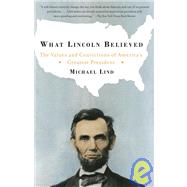What Lincoln Believed The Values and Convictions of America's Greatest President
, by LIND, MICHAEL- ISBN: 9781400030736 | 1400030730
- Cover: Paperback
- Copyright: 5/9/2006
In Independence Hall in Philadelphia on February 22, 1861, where he stopped to speak as he traveled to his inauguration as president of the United States, Lincoln asserted that "the sentiment embodied in" the Declaration of Independence had made the American Revolution a source of "hope to the world for all future time." Lincoln asked: "Now, my friends, can this country be saved upon that basis? If it can, I will consider myself one of the happiest men in the world if I can help to save it. If it can't be saved upon that principle, it will be truly awful." Other presidents might have saved the American Union, and other movements might have produced forms of representative government in other countries. But Abraham Lincoln helped to ensure that "government of the people, by the people, for the people" as an ideal for all of humanity would "not perish from the earth." Lincoln preserved both the United States and its political creed: "The theory of our government is universal freedom." Few biographers and historians have taken Lincoln's ideas seriously or placed him in the context of major intellectual traditions. In What Lincoln Believed, the most comprehensive study ever written of the thought of America's most revered president, Michael Lind provides a resource to the public philosophy that guided Lincoln as a statesman and shaped the United States. Although he is often presented as an idealist dedicated to political abstractions, Lincoln was a pragmatic politician with a lifelong interest in science, technology, and economics. Throughout his career he was a disciple of the Kentucky senator Henry Clay, whose "American System" of government support for industrial capitalism Lincoln promoted when he served in the Illinois statehouse, the U.S. Congress, and the White House. Today Lincoln is remembered for his opposition to slavery and his leadership in guiding the Union to victory in the Civil War. But Lincoln's thinking about these subjects is widely misunderstood. His deep opposition to slavery was rooted in his allegiance to the ideals of the American Revolution. Only late in his life, however, did Lincoln abandon his support for the policy of "colonizing" black Americans abroad, which he derived from Henry Clay and Thomas Jefferson. Lincoln and most of his fellow Republicans opposed the extension of slavery outside of the South because they wanted an all-white West, not a racially integrated society. Although the Great Emancipator was not the Great Integrationist, he was the Great Democrat. In an age in which many argued that only whites were capable of republican government, Lincoln insisted on the universality of human rights and the potential for democracy everywhere. In a century in which liberal and democratic revolutions against monarchy and dictatorship in Europe and Latin America repeatedly had failed, Lincoln believed that liberal democracy as a form of government was on trial in the American Civil War. "Our popular government has often been called an experiment," Lincoln told the U.S. Congress, insisting that the American people had to prove to the world that "when ballots have fairly, and constitutionally, decided, there can be no successful appeal, back to bullets." If the United States fell apart after the losers in an election took up arms, then people everywhere might conclude that democracy inevitably led to anarchy and "government of the people, by the people, for the people" might well "perish from the earth." "He loved his country partly because it was his own country, but mostly because it was a free country." What Lincoln said of Henry Clay could be said of hi






